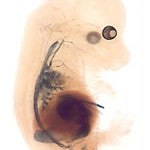Developmental Biology
 There have been dramatic advances in recent years in our understanding of problems in developmental biology. Many questions in this discipline were formulated decades ago, but have been intractable because of the lack of adequate methods to study them. The availability of recombinant DNA techniques has revolutionized the field by enabling investigators to define critical steps in transcription and processing of developmentally regulated genes. New methods for producing monotypic antibodies have provided very precise analyses of changes in the levels of specific proteins, changes in the cell surface in embryonic cells or changes in the localization of proteins within those cells. Analysis of developmentally-controlled genes and their regulatory regions has allowed identification of specific transcription factors and related cascades of controlling reactions that couple one signal to the expression of a new constellation of proteins in the cascade. Complex developmental phenomena, such as cell determination, the control of cell differentiation, and embryonic induction of pattern formation, are becoming amenable to systematic analysis and promise an exciting challenge for the future.At the University of Virginia, developmental biology is the major research interest of many faculty members. Research areas range from molecular analysis of alternative RNA splicing in different cell lines to highly integrated aspects of cell movement during embryological development and determination of tissue type. Several groups are concerned with understanding the structure and regulation of specific genes in differentiating cells. There is considerable intellectual exchange among members of these groups to keep abreast of this rapidly changing field. Other investigators are interested in the signals controlling cell determination and differentiation, including those involved in specific embryonic tissue interactions and the differentiation of highly synchronous populations of cultured embryonic cells. Several groups are studying the processes of oogenesis and spermatogenesis; the development of egg and sperm are intriguing models for cell differentiation and are of obvious importance in reproductive biology. These groups work not only on many different areas of developmental biology, but also on many different organisms, from Drosophila to mammals. The major topics of interest among the researchers in this group of the Cell and Molecular Biology program at the University of Virginia are the developmental process in Drosophila and the development of the reproductive system in vertebrate animals. A University-wide Developmental Biology Training Grant provides a formal network for communication among these groups.
There have been dramatic advances in recent years in our understanding of problems in developmental biology. Many questions in this discipline were formulated decades ago, but have been intractable because of the lack of adequate methods to study them. The availability of recombinant DNA techniques has revolutionized the field by enabling investigators to define critical steps in transcription and processing of developmentally regulated genes. New methods for producing monotypic antibodies have provided very precise analyses of changes in the levels of specific proteins, changes in the cell surface in embryonic cells or changes in the localization of proteins within those cells. Analysis of developmentally-controlled genes and their regulatory regions has allowed identification of specific transcription factors and related cascades of controlling reactions that couple one signal to the expression of a new constellation of proteins in the cascade. Complex developmental phenomena, such as cell determination, the control of cell differentiation, and embryonic induction of pattern formation, are becoming amenable to systematic analysis and promise an exciting challenge for the future.At the University of Virginia, developmental biology is the major research interest of many faculty members. Research areas range from molecular analysis of alternative RNA splicing in different cell lines to highly integrated aspects of cell movement during embryological development and determination of tissue type. Several groups are concerned with understanding the structure and regulation of specific genes in differentiating cells. There is considerable intellectual exchange among members of these groups to keep abreast of this rapidly changing field. Other investigators are interested in the signals controlling cell determination and differentiation, including those involved in specific embryonic tissue interactions and the differentiation of highly synchronous populations of cultured embryonic cells. Several groups are studying the processes of oogenesis and spermatogenesis; the development of egg and sperm are intriguing models for cell differentiation and are of obvious importance in reproductive biology. These groups work not only on many different areas of developmental biology, but also on many different organisms, from Drosophila to mammals. The major topics of interest among the researchers in this group of the Cell and Molecular Biology program at the University of Virginia are the developmental process in Drosophila and the development of the reproductive system in vertebrate animals. A University-wide Developmental Biology Training Grant provides a formal network for communication among these groups.
Faculty in this Area
Search Research Faculty Directory >
Paul N. Adler, PhD
Planar signaling, polarity and morphogenesis.
Claire R. Cronmiller, PhD
Genetic Regulation of Morphogenesis and Reproduction in Drosophila
Douglas W. DeSimone, PhD
Cell Adhesion and Adhesion-Dependent Cell Signaling in Vertebrate Morphogenesis
Barry M. Gumbiner, PhD
Cell Adhesion and Morphogenesis; Cancer mechanisms; Cadherins and catenins; Hippo signaling pathway
Jay Hirsh, PhD
Molecular genetics; development and function of neurotransmitter-synthesizing neurons in Drosophila
Synapse Formation and Cell Migration in Normal and Pathobiology-Adhesion, Signaling, Imaging and Proteomics
Raymond E. Keller, PhD
Cellular and molecular mechanisms of morphogenesis
Jeh-Ping (Serena) Liu, PhD
Spinal Cord Development and Motor Neuron Differentiation
Gary K. Owens, PhD
Epigenetic Control of Perivascular and Stem Cell Plasticity/Trans-Differentiation during Injury-Repair and in Disease
Margaret A. Shupnik, PhD
Hypothalamic Peptide and Steroid Regulation of Pituitary Gene Transcription; Estrogen Action in Neuroendocrine and Reproductive Tissues; Estrogen Action in Breast Cancer
W. Michael Wormington, PhD
Regulation of miRNA Processing and Function During Oogenesis and Embryogenesis
